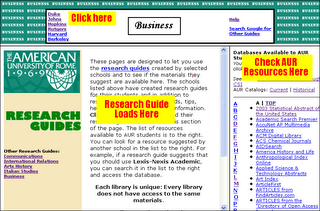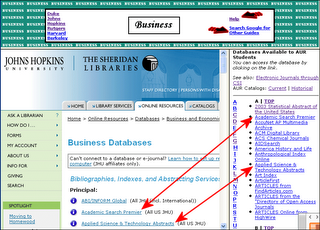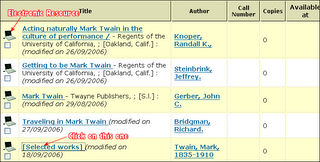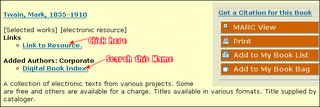Everybody loves to hate citations. They are a lot of work to create and organize. But when they are done correctly, they are actually a very powerful tool for research. How do they work? But first, let's discuss how to get some answers to those questions: how do I cite this book/journal article/website ....?
One way of getting these citation guides is to get into the catalog and click Help. This will get you into the AUR Library Wiki and you can either scroll through the pages or search for citation guides and you will find this page: Citation Guides. Here you will find a list of links to citation guides created at some other schools. These are the guides that we feel are the best. There are normally lots of examples to help you create your citation. There is also a separate guide for electronic resources--something that is still rather new. If you are having trouble, or there is a format that you can't find, e.g. a map, don't hesitate to ask us.
You can also search in the AUR catalog for Style manuals.
"Automatic" Citations
A real advantage today is that often, you can get citations automatically. Citations for most books can be gotten from WorldCat, while most journal databases offer a way to get citations easily. See the AUR Help Wiki for more information.
It's important to realize that these citations are often incomplete, and you need to add extra information such as page numbers, translators, or change information for different versions of the text, e.g. electronic. You are still responsible for any citations you give.
Still, this can come in very handy and give you 75% or more of a citation. If you're lucky, you might get 100%!
In the next post, we'll discuss how citations are not only a pain, but how they can help you do your research. That is, if they are done well.
Tuesday, November 14, 2006
Tuesday, October 10, 2006
Research Guides
Every library has guides to help their students do their research. These can be anything from highly in-depth guides to more general ones. Now that the internet is easily available, it is possible to simply link to guides on the web created by other libraries. Very simple.
The problem is that every library does not have access to the same materials. This is especially true today of the electronic databases, which contain thousands of journals. If two libraries subscribe to two different electronic databases, often they have access to completely different journals. This is why AUR's research guides are a little different. These research guides help you to find materials suggested by other libraries and then discover if those materials are available here.

When you click on a research guide, you will see a page with three frames. The top frame gives access to the different guides at selected universities. When you select one, e.g. Johns Hopkins, it will load into the lower left frame. From here, you can read their recommendations, tips, etc. and if they suggest a database, you can compare it with our list, which is in the lower-right hand side. From here, you can go directly into the database.
 Here is an example of how it works. Johns Hopkins has suggested ABI/Inform, Academic Search Premier, and Applied Science & Technology Abstracts. You can check with our resources and discover that we have the last two, but not ABI/Inform.
Here is an example of how it works. Johns Hopkins has suggested ABI/Inform, Academic Search Premier, and Applied Science & Technology Abstracts. You can check with our resources and discover that we have the last two, but not ABI/Inform.
If you want individual journals, you can search Electronic Journals through CSI, and there are links to our catalogs.
Finally, clicking on Help in the top frame reloads the first page back into the lower left frame, and you can also click on Search Google for Other Guides, which will do an automatic search for library guides on the topic you have selected.
The guides are always available when you click on Help in the Current catalog. Click here to work with them now.
The problem is that every library does not have access to the same materials. This is especially true today of the electronic databases, which contain thousands of journals. If two libraries subscribe to two different electronic databases, often they have access to completely different journals. This is why AUR's research guides are a little different. These research guides help you to find materials suggested by other libraries and then discover if those materials are available here.

When you click on a research guide, you will see a page with three frames. The top frame gives access to the different guides at selected universities. When you select one, e.g. Johns Hopkins, it will load into the lower left frame. From here, you can read their recommendations, tips, etc. and if they suggest a database, you can compare it with our list, which is in the lower-right hand side. From here, you can go directly into the database.
 Here is an example of how it works. Johns Hopkins has suggested ABI/Inform, Academic Search Premier, and Applied Science & Technology Abstracts. You can check with our resources and discover that we have the last two, but not ABI/Inform.
Here is an example of how it works. Johns Hopkins has suggested ABI/Inform, Academic Search Premier, and Applied Science & Technology Abstracts. You can check with our resources and discover that we have the last two, but not ABI/Inform.If you want individual journals, you can search Electronic Journals through CSI, and there are links to our catalogs.
Finally, clicking on Help in the top frame reloads the first page back into the lower left frame, and you can also click on Search Google for Other Guides, which will do an automatic search for library guides on the topic you have selected.
The guides are always available when you click on Help in the Current catalog. Click here to work with them now.
Wednesday, October 04, 2006
Changes in the Library
There are several changes in the AUR Library from the previous semesters, including adding a blog. Here, we will try to inform our users on new services in the AUR library, new books or websites, or perhaps simply some interesting news.
The first important development is that the library has changed! There is a different classification for the new books: the Library of Congress Classification. The old books still have their previous numbers, but we will be reclassifying them. To find the books, now you need a Library Map, which shows where everything is.
 There is also a new catalog, which contains all books received after July 2006, and lots of electronic books. To see some of the differences, search Mark Twain in the old catalog, and you will find one book: The Innocents Abroad. Search for Mark Twain in the new catalog, and you will find five works, all electronic (you can tell by the little laptop computer), but in this case, look especially at the one named [Selected works].
There is also a new catalog, which contains all books received after July 2006, and lots of electronic books. To see some of the differences, search Mark Twain in the old catalog, and you will find one book: The Innocents Abroad. Search for Mark Twain in the new catalog, and you will find five works, all electronic (you can tell by the little laptop computer), but in this case, look especially at the one named [Selected works].When you look at the record, you will see a link
 called: Link to Resource. When you click that link, you will go to another site, which has links to almost all of Twain's works, and almost all of them are available for free. Twain's books are not the only things that are available in this way--literally thousands of authors and tens of thousands of books are available if you search for Digital Book Index.
called: Link to Resource. When you click that link, you will go to another site, which has links to almost all of Twain's works, and almost all of them are available for free. Twain's books are not the only things that are available in this way--literally thousands of authors and tens of thousands of books are available if you search for Digital Book Index.All we can ask is to please, please, please, be careful of printing these types of resources. Ask us in the library. We can all save a lot of trees if we work together.
There are a lot more changes. These are only the most visible ones. Many more posts will follow.
Subscribe to:
Posts (Atom)